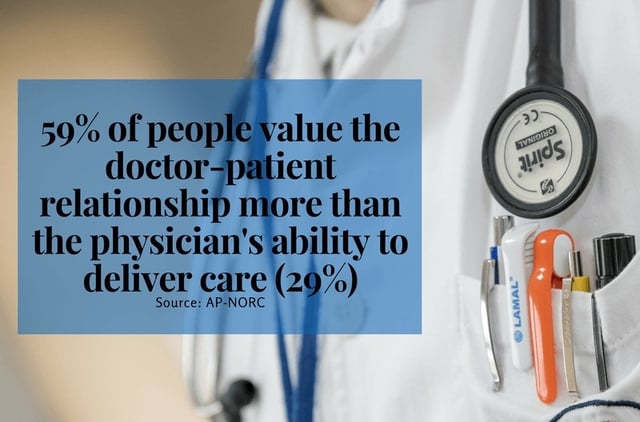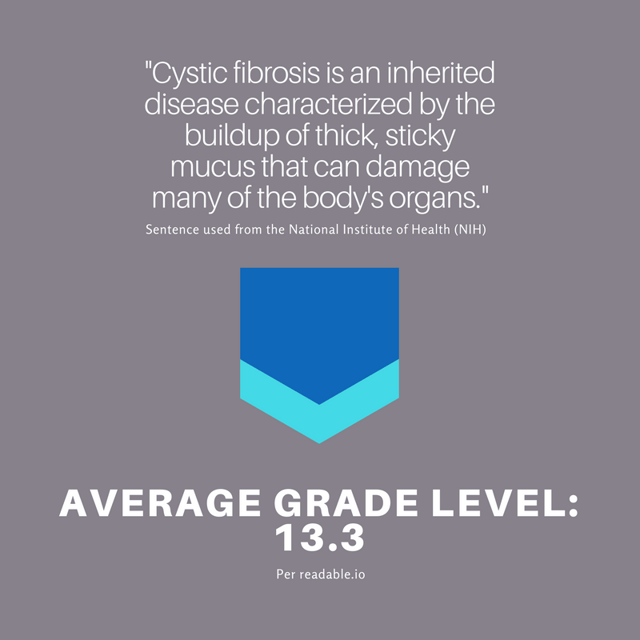Imagine a familiar scenario: two patients come to a practice with similar health issues. They each see a different doctor and receive the following feedback.
Doctor A responds: Your LDL is too high and I’m seeing clear signs of metabolic syndrome. Your BMP is negative, but we need to bring down your BMI with nutritional solutions and exercise.
Doctor B says: Your bad cholesterol is too high, and that concerns me because high cholesterol, a larger waistline and high blood pressure can signal greater risk for stroke, heart disease and other conditions. Even though your test results look good, I suggest we focus on weight loss through a healthier diet and more physical activity.
It’s not hard to guess which patient feels more informed and at ease upon leaving her consultation. Now imagine the same scenario, but with no doctor in the room. Instead, these patients are reading healthcare blogs written by the doctors mentioned above.
Doctor A posts: Lower LDL and BMI to Minimize Metabolic Syndrome Dangers
Doctor B writes: Help Lower Your Risk of Stroke, Heart Disease and Diabetes With Diet and Exercise
It becomes even easier to imagine which doctor puts her patient’s mind at ease with this example.
Content marketing is a great way to win new clients and educate and engage existing patients. By creating an in-depth blog, landing pages and articles, you offer patients reputable information that they can use to make better health decisions and that establishes you as a trusted authority. However, they have to be able to understand that information for your content to work.
Content marketing tells us that using big, fancy words online isn’t just bad for reader comprehension, but it’s also bad for SEO. This means it’s more important than ever for medical professionals to leave the jargon where it belongs: in medical journals.
When crafting material for your healthcare blog or website, your role shifts from doctor to content marketer. As a doctor, you offer value to patients through your education, diagnostic techniques and experience.
As a content marketer, that value is offered through the presentation of digestible information. Cutting out jargon is an important step in making this transition, and here’s why.
Jargon Won’t Get You Ranking for Keywords
According to Google, 1 in 20 searches in 2015 were for health-related info. In order to get your healthcare business ranking on such a crowded search engine results page (SERP), you have to optimize your content with keywords. That’s not to say that jargon can’t be a keyword, but it’s probably not the keyword your target audience is searching for.
For example, are your patients typing in, “best myocardial infarction hospitals” or “best heart attack hospitals”? Probably the latter, since the U.S. Department of Health and Human Services reveals that only 12% of American adults have proficient health literacy.
So, if you’re marketing to other healthcare professionals in the field, jargon may very well be appropriate. But if your website is intended for any other audience, always opt for the layman’s terms to help drive traffic.
Patients Value Your Personality Traits More than Skill
Sometimes, medical businesses like to rely on jargon and advanced vocabulary to make themselves appear professional and better informed. While it’s important for readers to view you as knowledgeable and proficient, there’s a better way to showcase your expertise – by being concise. Short sentences can be just as intelligent, if not more so, than longer ones.
And in fact, research shows that patients don’t actually care how smart you are.
A study published by the Associated Press-NORC Center for Public Affairs Research asked Americans to describe what makes a great healthcare provider. 59% of people think the doctor-patient relationship is most important, compared to only 29% who think the doctor’s ability to deliver care and achieve positive health outcomes is the most important.

So when people are browsing providers online – as 77% of patients will do before making an appointment – they’re looking to see how caring and compassionate you are. Not how much jargon you can squeeze into a single paragraph.
You can do this by adopting a more conversational tone in your blog posts and landing pages. Forget the AP style guide and don’t be afraid to use contractions, pronouns and incomplete sentences. Your website isn’t a research paper; it’s a place to interact with your patients. Therefore, all of your content should sound like a helpful friend in order to appear more trustworthy.
Jargon Makes it Hard for Readers to Understand
Remember, patient readability levels don’t just apply to consent forms, medication instructions and procedure information. They should also be considered when creating website and blog content. While it’s best to understand your own target audience, research published in Respir Care reveals that as a general rule of thumb, your content should not exceed a 7th grade reading level. This makes it accessible to a broader range of patients visiting your site.
But as most medical terms are complex and have multiple syllables, they don’t usually fall within that 7th grade range.

Here are some more tips on how to make sure your website and blog content is easy to understand:
- Replace long words and phrases with shorter synonyms (Example: high blood pressure instead of hypertension)
- Use active voice instead of passive (it’s more actionable and tends to be shorter, too)
- Break up long, compound sentences into multiple sentences (HubSpot recommends 10 – 20 words per sentence)
- If you have to use advanced terms, make sure you fully explain them
- Create blog topics with digestible formats, like how-to posts, lists and tips
- Use short paragraphs
- Remove words and sentences that don’t add any value to the piece
- Always spell out acronyms at least once
This is important to help patients and prospective patients alike understand what your business has to offer. Replace as much confusing jargon as you can or else you risk raising more questions than you answer and causing stress where you intend to educate or bring comfort.
Jargon Doesn’t Leave a Lasting Impression
How does your website compare to your competitors? When people are looking up area healthcare providers, they probably won’t remember your site if it’s bogged down by jargon. And if you only have a few landing pages, they probably won’t spend much time on your site at all.
They will remember, however, the providers that have helpful healthcare blogs and who use conversational tones. Successful blogs can convey that human connection and often make patients feel like the doctor is interested in them before ever making an appointment.

Need help creating quality content that informs and builds trust? Virtucom Group’s content writing services provide the blog posts, landing pages and other content your practice needs to appeal to new and existing patients alike. Contact us today for help relieving the symptoms of bad content.






